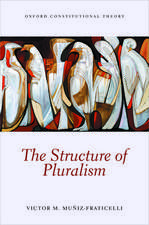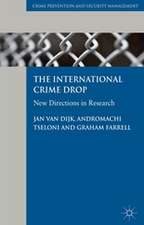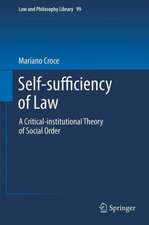The New Faces of Victimhood: Globalization, Transnational Crimes and Victim Rights: Studies in Global Justice, cartea 8
Editat de Rianne Letschert, Jan Van Dijken Limba Engleză Paperback – 2 feb 2012
In part I Jan Van Dijk and Rianne Letschert present an overview of trends in criminal victimization against the backdrop of globalization using a unique set of statistical indicators. By placing this issue in the framework of the human security concept, the authors draw out its broader political and normative implications. Theologist Ralf Bodelier explains how modern communication technologies have heightened sensitivities among the general public for human insecurities anywhere in the world. In his view, a new global conscience is in the making that may become the cornerstone of international solidarity and action. Marc Groenhuijsen and Rianne Letschert describe the emergence of national and international legal and institutional arrangements to offer remedies to victims of crime in an era of globalization.
In part II a selection of experts analyse the specific issues surrounding the protection and empowerment of victims of different types of international crimes such as human trafficking, organised crime/corruption, terrorism, global corporate crime and cross border environmental crimes. In part III focused attention is givento the special challenges and opportunities of protecting and assisting crime victims in cyberspace. Part IV deals with emerging victim issues in humanitarian law such as the accountability of private military companies and the implementation of the ambitious victim provisions in the statute of the International Criminal Court including the establishment of a global fund for reparations.
In the final part of the book some of its core authors formulate their ideas about the international institutional arrangements that should be put in place to offer justice to the victims of globalization. A concrete proposal is made for the transformation of the United Nations 1985 Declaration on the Principles of Justice for Victims of Crime and Abuse of Power into a full-fledged UN convention. In the final chapter further proposals are made for the increased involvement of regional organisations such as the European Union in the protection of victims of global crime.
| Toate formatele și edițiile | Preț | Express |
|---|---|---|
| Paperback (1) | 947.50 lei 6-8 săpt. | |
| SPRINGER NETHERLANDS – 2 feb 2012 | 947.50 lei 6-8 săpt. | |
| Hardback (1) | 953.52 lei 6-8 săpt. | |
| SPRINGER NETHERLANDS – 23 dec 2010 | 953.52 lei 6-8 săpt. |
Din seria Studies in Global Justice
-
 Preț: 212.66 lei
Preț: 212.66 lei - 18%
 Preț: 1222.49 lei
Preț: 1222.49 lei - 18%
 Preț: 942.44 lei
Preț: 942.44 lei - 15%
 Preț: 639.73 lei
Preț: 639.73 lei - 15%
 Preț: 636.80 lei
Preț: 636.80 lei - 18%
 Preț: 892.74 lei
Preț: 892.74 lei -
 Preț: 354.54 lei
Preț: 354.54 lei - 15%
 Preț: 648.24 lei
Preț: 648.24 lei -
 Preț: 446.47 lei
Preț: 446.47 lei - 15%
 Preț: 641.71 lei
Preț: 641.71 lei - 18%
 Preț: 731.91 lei
Preț: 731.91 lei - 15%
 Preț: 587.72 lei
Preț: 587.72 lei - 18%
 Preț: 945.47 lei
Preț: 945.47 lei - 24%
 Preț: 626.04 lei
Preț: 626.04 lei - 18%
 Preț: 892.28 lei
Preț: 892.28 lei - 18%
 Preț: 948.92 lei
Preț: 948.92 lei - 15%
 Preț: 641.03 lei
Preț: 641.03 lei - 15%
 Preț: 637.13 lei
Preț: 637.13 lei - 15%
 Preț: 638.57 lei
Preț: 638.57 lei - 15%
 Preț: 635.96 lei
Preț: 635.96 lei - 15%
 Preț: 639.25 lei
Preț: 639.25 lei
Preț: 947.50 lei
Preț vechi: 1155.48 lei
-18% Nou
Puncte Express: 1421
Preț estimativ în valută:
181.33€ • 188.61$ • 149.70£
181.33€ • 188.61$ • 149.70£
Carte tipărită la comandă
Livrare economică 15-29 aprilie
Preluare comenzi: 021 569.72.76
Specificații
ISBN-13: 9789400738966
ISBN-10: 940073896X
Pagini: 360
Ilustrații: XIV, 343 p. 1 illus.
Dimensiuni: 155 x 235 x 23 mm
Greutate: 0.5 kg
Ediția:2011
Editura: SPRINGER NETHERLANDS
Colecția Springer
Seria Studies in Global Justice
Locul publicării:Dordrecht, Netherlands
ISBN-10: 940073896X
Pagini: 360
Ilustrații: XIV, 343 p. 1 illus.
Dimensiuni: 155 x 235 x 23 mm
Greutate: 0.5 kg
Ediția:2011
Editura: SPRINGER NETHERLANDS
Colecția Springer
Seria Studies in Global Justice
Locul publicării:Dordrecht, Netherlands
Public țintă
ResearchCuprins
Preface.- Information on the Authors.- Part I Introductions and Overviews.- Chapter 1 New Faces of Victimhood; Reflections on the Unjust sides of Globalization; Rianne Letschert and Jan Van Dijk.- Chapter 2 Global Governance and Global Crime – Do Victims Fall in Between?; Rianne Letschert and Marc Groenhuijsen.- Chapter 3 Human Security and the Emergence of a Global Conscience; Ralf Bodelier.- Part II Victims of Transnational Crimes.- Chapter 4 Trafficking for Sexual Purposes as a Globalized Shadow Economy;Human Security as the Tool to Facilitate a Human Rights Based Approach; Conny Rijken and Renée Römkens.- Chapter 5 Transnational Organized Crime, Civil Society and Victim Empowerment; Jan Van Dijk.- Chapter 6 Victims of Environmental Pollution in the Slipstream of Globalization; Jonathan Verschuuren and Steve Kuchta.- Part III Victim Protection in Cyberspace.- Chapter 7 The Challenge of Identity Theft in Multi-level Governance; Towards a Coordinated Action Plan for Protecting and Empowering Victims; Nicole van der Meulen and Bert-Jaap Koops.- Chapter 8 International (Cyber)Stalking; Impediments to Investigation and Prosecution; Suzan van der Aa.- Chapter 9 Digital Tools: Risks and Opportunities for Victims; Explorations in E-victimology; Corien Prins.- Part IV Victims of Conflicts and Wars.- Chapter 10 Al Qaeda and Vicarious Victims; Some Victimological Insights into Globalized Terrorism; Antony Pemberton.- Chapter 11 Protecting the Victims of the Privatization of War; Willem Van Genugten, Marie-Jose Van der Heijden and Nicola Jägers.- Chapter 12 Globalization and Victims’ Rights at the International Criminal Court; Jo-Anne Wemmers and Anne-Marie de Brouwer.- Part V Conclusion.- Chapter 13 Reconstructing Victim-centered Justice on a Global Scale; Jan van Dijk and Rianne Letschert.- Bibliography.- Index.
Textul de pe ultima copertă
Besides generating wealth, globalization makes victims, including victims of new forms of crime. In this edited book of scholarly essays, international lawyers and criminologists reflect on the legal challenges posed by these dark sides of globalization. Examples include transnational organised crime, human trafficking and corruption, cyber crimes, international terrorism, global corporate crime and cross-border environmental crimes. The authors reflect on the limits of domestic systems of justice in providing protection, empowerment and redress to the victims of these emerging forms of global insecurity. They argue for the need of better international or supra-national institutional arrangements such as legal instruments and actions of the United Nations or regional organizations such as the European Union.
These well-researched and deeply disturbing essays trace the globalization of victimization. Human trafficking, terrorism, cybercrime, and the exploitation of immigrant workers and war refugees are among the criminal activities examined in this highly-recommended volume whose victims fall largely outside the current scope and jurisdiction of domestic and international law. These detailed and compassionate expos reflecting the ongoing research and policy reform efforts by legal scholars and human rights advocates at the International Victimology Institute (INTERVICT) in the Netherlands, aim at informing the international community about these continuing atrocities, while posing sensible reforms to bring their victims under the protection of the rule of law.
George R. Lucas, Jr.
Class of 1984 Distinguished Chair in Ethics, U.S. Naval Academy (Annapolis, MD)
This compelling collection of essays challenges scholars and practitioners alike with its innovative look at what is owed the victims of global crimes. Contributors address some of the most difficult cross-border or transnational topics such as toxic dumping,human trafficking, environmental crimes, and cyber piracy. Skillfully utilizing the most important recent research in global justice as well as international law and policy, this collection offers a careful scrutiny of the dark side of globalization. Timely and engaging, the book is a valuable contribution to the Global Justice Series and indeed to the burgeoning literature on human security and human rights.
Sally Scholz
Professor of Philosophy, Villanova University,
Co-Editor, Journal for Peace and Justice Studies
These well-researched and deeply disturbing essays trace the globalization of victimization. Human trafficking, terrorism, cybercrime, and the exploitation of immigrant workers and war refugees are among the criminal activities examined in this highly-recommended volume whose victims fall largely outside the current scope and jurisdiction of domestic and international law. These detailed and compassionate expos reflecting the ongoing research and policy reform efforts by legal scholars and human rights advocates at the International Victimology Institute (INTERVICT) in the Netherlands, aim at informing the international community about these continuing atrocities, while posing sensible reforms to bring their victims under the protection of the rule of law.
George R. Lucas, Jr.
Class of 1984 Distinguished Chair in Ethics, U.S. Naval Academy (Annapolis, MD)
This compelling collection of essays challenges scholars and practitioners alike with its innovative look at what is owed the victims of global crimes. Contributors address some of the most difficult cross-border or transnational topics such as toxic dumping,human trafficking, environmental crimes, and cyber piracy. Skillfully utilizing the most important recent research in global justice as well as international law and policy, this collection offers a careful scrutiny of the dark side of globalization. Timely and engaging, the book is a valuable contribution to the Global Justice Series and indeed to the burgeoning literature on human security and human rights.
Sally Scholz
Professor of Philosophy, Villanova University,
Co-Editor, Journal for Peace and Justice Studies
Caracteristici
Connects victims’ rights to human rights and globalisation issues for the first time Provides balanced coverage of the broader issues of globalization and the emerging global institutions Creates a new opening for scholarship and policy directives Includes supplementary material: sn.pub/extras





















